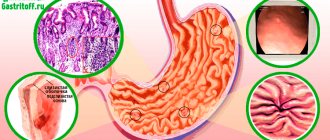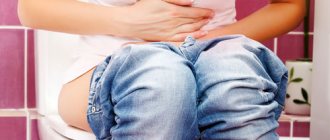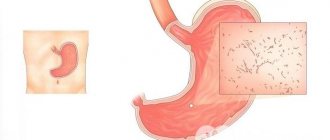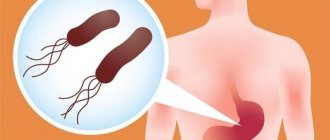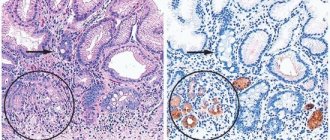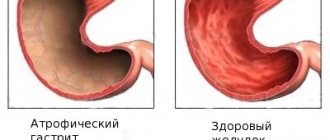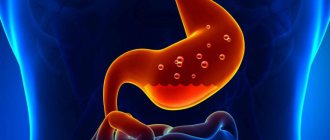Causes of superficial gastritis
Up to 80%[1], and according to some experts, all 90%[2] of chronic gastritis are caused by Helicobacter pylori infection. Helicobacter is an acid-fast bacillus that settles on the surface of the gastric mucosa. Its waste products damage the cells of the mucous membrane, causing chronic inflammation.
Another 5 to 15% (as in the case of Helicobacter pylori infection, different authors have different statistics) is due to autoimmune gastritis. This is a condition in which the immune system begins to perceive its own cells as foreign proteins, in this case the cells of the gastric mucosa.
Among other causes, the most common are uncontrolled use of medications and duodenogastric reflux.
Duodenogastric reflux is the reflux of the contents of the duodenum into the stomach. The intestinal contents are radically different from the gastric contents: they have an alkaline reaction (as is known, the environment in the stomach is acidic), contain a suspension of bile acids with a pronounced irritating effect, and enzymes that break down proteins, fats and carbohydrates. All this cannot but damage the cells of the gastric mucosa, and any damage entails an inflammatory reaction.
As for uncontrolled medication use as a cause of superficial gastritis, the disease is most often provoked by drugs from the group of non-steroidal anti-inflammatory drugs. These are drugs such as paracetamol, ibuprofen, diclofenac: all of them can be bought at a pharmacy without a prescription and taken for years without seeing a doctor.
Non-steroidal anti-inflammatory drugs block the production of special substances called inflammatory mediators - they are the ones that cause fever, pain, and swelling. But at the same time, the synthesis of substances similar in chemical structure, which regulate the restoration of cells of the gastric mucosa, is also blocked. Under the influence of an aggressive environment, the mucous membrane is damaged and inflammation begins.
Of course, alcohol abuse, spicy and too hot food, and smoking play a certain role in the development of superficial gastritis (vessels narrowed by nicotine nourish the mucous membrane worse). But these factors are far from the main ones and only intensify the inflammatory process that has already begun, without being its cause.
ethnoscience
Traditional medicine will help eliminate, but not completely cure, focal superficial gastritis. Along with it, you need to adhere to the recommendations of a medical professional and follow them exactly. If after a certain course there are no positive dynamics, consult with him again. It may be necessary to replace the medication with other medications.
Flax seed
Pour three tablespoons of flaxseeds into a thermos, add a liter of boiled water, and leave to steep overnight. In the morning, strain the broth and take a glass before breakfast, lunch and dinner. An equally effective result is guaranteed by flaxseed oil. Its use is no different from other similar traditional medicine - 1/10 tablespoon twice a day.
Raw potato juice
It is advisable to use pink tubers for its preparation, as they contain more useful substances. If this is not the case, you can take what is at hand at the moment. In general, what you need to do is this: grate 1 large tuber on a fine grater, transfer the resulting mass to a gauze napkin or strainer, squeeze out the juice. You should get 1 whole glass, which should be drunk thirty minutes before meals. Particular effectiveness from this potato juice was observed when the patient, after consulting with a doctor, learned about his diagnosis and began treatment. The more advanced the disease, the more difficult it is to treat.
Propolis solution
Cooking method:
- place the propolis in the freezer for twenty minutes to make it easier to crumble;
- Grind propolis (30 g) into powder and mix with boiled water (100 ml);
- put on low heat and simmer for one hour. Don't forget to stir because it may burn;
- strain through several layers of cheesecloth.
When the solution has cooled, it should be poured into a dark bottle and stored at room temperature for about a week. Thus, its beneficial properties will be preserved. Take the product 100-150 ml twice a day. The duration of treatment is about two weeks.
Burdock root
People have been treating focal superficial gastritis with this method for many years, and they report significant results after just a few uses.
The course of treatment can be carried out using fresh burdock root (no preliminary preparation is required, as long as you wash off the remaining soil from it). They need to eat 4-5 roots for one month.
But besides this option, there is another way: take one teaspoon of crushed burdock root per glass of boiling water. Leave overnight. In the morning, strain and drink a third of a glass in fifteen minutes three times a day.
Symptoms of superficial gastritis
With superficial gastritis, the pain is diffuse.
Signs of superficial gastritis, as a rule, are reduced to symptoms united by the term “dyspepsia”:
- heaviness, fullness, pressure in the epigastric region,
- belching,
- heartburn,
- bloating,
- unpleasant taste in the mouth.
These symptoms can appear either as a complex or individually. Pain with superficial gastritis does not always occur. When there are unpleasant sensations, they usually affect a large area in the upper abdomen. If, with an ulcer or single erosion, when talking about pain, the patient points to the disturbing area with one or two fingers, then with superficial gastritis, he covers it with the entire palm.
In addition to local manifestations, general symptoms may appear: weakness, irritability, arrhythmia, and a tendency to low blood pressure. This is due to the fact that the mucous membrane of the gastrointestinal tract, in addition to digestive enzymes, produces many biologically active substances that affect other body systems.
How is it diagnosed?
Using an endoscope, damaged stomach tissue is visualized.
If signs of the disease appear, you should not endure pain or self-medicate, you need to go to a gastroenterologist and have your stomach examined. To make a diagnosis, the following examinations are carried out:
- Coprogram is a stool analysis that allows you to identify pathology in the gastrointestinal tract.
- Ultrasound examination of the abdominal organs.
- Endoscopy - insertion of a tube with sensors into the stomach through the mouth. The most accurate method.
Diagnosis of superficial gastritis
According to modern medical concepts, chronic superficial gastritis is a morphological diagnosis. This means that the presence of inflammation must be confirmed using endoscopic and histological studies. The doctor can see signs of inflammation with fibrogastroscopy. Next, he must take samples from at least 5 areas[3] of the mucous membrane of different parts of the stomach. These samples are examined under a microscope, determining the activity and depth of inflammation.
To make sure that the secretory function of the stomach is not impaired, pH-metry is done - determining the acidity of the gastric contents.
The presence or absence of Helicobacter pylori infection is indicated by a breath test or samples taken from biopsies taken during endoscopy. If at least one diagnostic method gives a positive result, infection is considered proven. If the result is negative, you need to double-check using another method, since all tests for identifying Helicobacter have an error: the sensitivity of various methods ranges from 68 to 96% [4].
As an alternative to fibrogastroscopy, double contrast radiography can be used to diagnose superficial gastritis. Signs of gastritis may include swelling, thickening of the folds of the mucous membrane, and changes in motility.
Complications and occurrence of related diseases
In the absence of timely treatment, inflammation begins to spread to other organs of the gastrointestinal tract. The following complications are most often diagnosed:
- Reflux esophagitis. Gastritis increases pressure inside the stomach. Reflux esophagitis occurs due to contact of the mucous membrane with the contents of the stomach. Due to increased acidity, the entire esophagus suffers.
- Intestinal metaplasia. The epithelium of the stomach is replaced by intestinal epithelium. Experts classify metaplasia as a precancerous condition, which indicates the seriousness of the complications.
- Malignant diseases. The inflammatory process can transform into cancer.
With prolonged gastritis, the patient's quality of life suffers. Constant pain, problems with stool, and bad breath cause discomfort. Sometimes complications appear soon after the onset of the inflammatory process, sometimes years later.
Treatment of superficial gastritis
Gastroscopy is the main method for diagnosing superficial gastritis
The treatment regimen for superficial gastritis may vary depending on the cause of its occurrence.
If the problem is an infection, the first thing you need to do is eliminate Helicobacter pylori. For this, a complex of drugs is recommended:
- proton pump inhibitors (omeprazole, pantoprazole, rabeprazole) – reduce the amount of hydrochloric acid in gastric secretions, which makes the environment unfavorable for bacteria;
- a combination of 2 or 3 antimicrobial drugs: Helicobacter is very resistant to antibiotics, so one drug is not enough.
After two weeks of therapy, a Helicobacter test is done again. If they are positive, the course of treatment is extended by changing antibiotics.
In cases where superficial gastritis is caused by the reflux of intestinal contents into the stomach, medications are prescribed that neutralize its effect on the gastric mucosa:
- bismuth tripotassium dicitrate – forms an additional protective film on the surface of the mucosa;
- sucralfate – binds bile acids, reduces the activity of inflammation and also forms a film that protects the mucous membrane;
- ursodeoxycholic acid preparations – neutralize toxic bile acids, reducing their ability to damage cells of the gastric mucosa;
- agents that regulate gastrointestinal motility (itopride hydrochloride, trimebutine, mebeverine, etc.).
If superficial gastritis is caused by taking non-steroidal anti-inflammatory drugs, they are discontinued.
Regardless of the cause of the disease, gastroprotectors based on rebamipide are definitely recommended - drugs that restore integrity to the mucous membrane of the gastrointestinal tract and thus eliminate inflammation, and therefore unpleasant symptoms. Rebamipide also increases the effectiveness of eradication (elimination) of Helicobacter. It can be combined with any drugs recommended for the treatment of superficial gastritis - rebamipide does not affect their action.
Traditional medicine tips
Additionally, traditional medicine advice is used as maintenance therapy. A number of recipes for stomach preparations have been described that have proven effective in the fight against diseases of the digestive system.
Only a doctor has the right to prescribe treatment. Certain types of gastritis cannot be cured solely by a healthy lifestyle and folk remedies. For example, if gastritis is caused by the bacterium Helicobacter pylori, relief will occur after the use of antibacterial therapy.
Based on this, it is recommended to use gastric preparations only after consulting a doctor. The prescribed treatment may be supplemented by the use of:
- An infusion based on a mixture of centaury, peppermint and St. John's wort in a 2:2:1 ratio.
- An infusion of equal parts of St. John's wort, plantain, and blueberry leaves.
- Rosehip decoction.
- Infusion of plantain leaves and white cabbage juice for gastritis of low acidity.
- An infusion of chamomile and yarrow flowers, leaves and stems of wormwood, mint, sage leaves, mixed in equal parts.
- Propolis tinctures.
- Infusion of pine buds or cedar cones.
- Sea buckthorn berry tea.
You can prepare the preparations yourself or purchase them ready-made at the pharmacy. The use of folk remedies should be agreed with your doctor. You should also be careful: too frequent use leads to allergic reactions. After diet therapy, many gastroenterologists prescribe sanatorium treatment.
